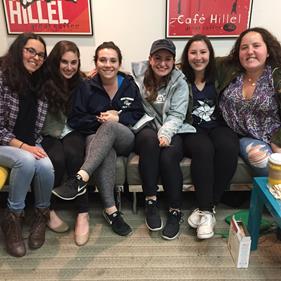Only Human

This piece was originally published in eJewish Philanthropy on May 26, 2017.
Above: Members of the GW Hillel women’s club gather Monday nights to hang out, spill secrets and investigate their own Jewish identities. Photo courtesy GW Hillel. Below: Emily Halpern. Photo by Geoffrey Melada.
“It’s a rather simple idea to gather women in a room to talk about Jewish identity.
But doing so becomes innovative when half of them might never have otherwise opted into that conversation.”
It’s Monday night on The George Washington University’s campus and the clock strikes 8:00 PM. A group of ten women stream through the doors of the GW Hillel space, dropping their bags and plopping onto comfortable couches and chairs. Chatter immediately fills the air. They have gathered to hang out, spill secrets and investigate their own Jewish identities: my most innovative program of the semester.
Before I go on with this story, let me take you back a few months. Just two weeks after my college graduation in June 2016, I moved to Washington, D.C. to join the inaugural cohort of Springboard Fellows as an innovation specialist.
After intensive training in design thinking, defined by Tim Brown, CEO of IDEO, as “a human-centered approach to innovation,” I was ready to jump into this work head first. I gave myself a modest mission: nothing short of changing the game of Jewish life on campus.
A semester passed, and I certainly didn’t feel like a game changer. I was beginning to lose confidence in design thinking, or at least in my ability to apply it. I asked myself: What is it about design thinking that has the business world so enraptured?
I thought back to our fellowship training at Hillel International and the two full days we had spent conducting in-depth interviews of members of the D.C. Jewish community. Then I recalled a feature of design thinking so radically retro that I had nearly overlooked it: empathy.
It was just around that time that first year student Rachel Katz met for one of the coffee dates Hillel is famous for. She shared with me her story: After attending GW Hillel’s early move-in program at the beginning of the semester, her participation in campus Jewish life had fallen off.
I asked her what was missing from her college experience. Her answer was every campus Jewish professional’s dream: She was craving the closeness of a Jewish community. A New Jersey native, Rachel had grown up in a tight-knit Jewish community she loved. She described her home Jewish community as “a safe space, an open space.”
Other young Jewish women told me similar things on campus coffee dates. I posed another question to Rachel: What would it look like to create a micro Jewish community for freshmen women? The answer came: Create a space for women to share with each other directly. A women’s group. The sisterhood club synagogues have had for years, rebooted for a new generation of Jewish women.
I will admit, the creative in me wanted something more. This wasn’t a sexy enough idea to be featured in Fast Company. Yet I knew how badly these women needed to come together, so I went all in.
We formed the group and the weekly meetings I led became a source of self-discovery, reflection and Jewish womanhood. Above all, it was the safe space Rachel and her friends said they needed.
For the first time in my life, I felt like both an educator and an innovator.
Looking back, says Rachel, she wanted to return to Hillel her first semester, remembering how warm and welcoming an atmosphere she found there, but she needed to know that she would meet other young Jewish women who shared her anxieties and aspirations about college life. And if “her people” weren’t already there, she wanted to be able to bring them with her.
Every Monday night at 8:00 PM, she did just that.
“Having that close knit safe space has played such an important role in my whole first year of college,” Rachel explains. At GW, “everyone has an internship, everyone is doing a million things. We get so wrapped up in the go-go-go atmosphere of school, work, and social media.” Through this Hillel club, she says, “I can take that comfort and expand on it: I am able to explore my Jewish identity in a new way. The perfect blend of mixing the old and the new.”
Can innovation be just that? Mixing the old and the new, stepping back to leap forward? It seems to me now that the most impactful campus programs might be those that maintain a student’s sense of comfort while simultaneously expanding their boundaries.
It’s a rather simple idea to gather women in a room to talk about Jewish identity. But doing so becomes innovative when half of them might never have otherwise opted into that conversation.
The process to get here wasn’t flashy or easily brandable. But perhaps it’s something more important: human.
This group of college women asking big Jewish questions changed my understanding of innovation itself. As I resume my work as a Springboard Fellow to build vibrant Jewish communities on campus, I will continue to ask myself: How might we leap forward by stepping back?
Emily Halpern is a Springboard Fellow in Innovation at GW Hillel.